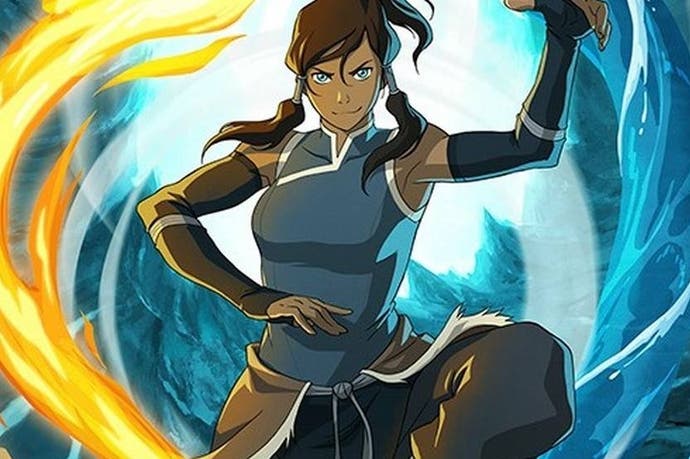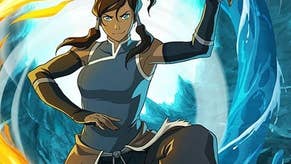The Legend of Korra review
Earth, wind and misfire.
With its trio of high-profile founders - Atsushi Inaba, Shinji Mikami and Hideki Kamiya - it's easy to forget that Platinum Games remains an independent video game studio. Such bright constellations of designers are usually only found clustered around the ancient behemoths of the industry -- Nintendo, Activision, once-upon-a-time Sega - those who have the wealth to attract, nurture and keep the famous names. But Platinum is a gun for hire, as equally willing to step in to salvage a Metal Gear spin-off as it is to birth a Bayonetta in order to keep going. There are electricity bills to pay at the end of each month, staff salaries to meet and, without a guaranteed stream of work, Platinum, like Treasure or Sumo Digital, must hustle to make payroll in a way that Miyamoto and his colleagues do not.
This goes some way to explain The Legend of Korra, an Activision-published tie-in to the Nickelodeon cartoon series that has been quietly developed by Platinum, presumably as a stopgap. It bears many of the hallmarks of a work-for-hire project rushed to meet a Christmas deadline: a short campaign, rudimentary menus, bland enemy designs, effect-less collectable items and a paucity of game assets (many of the game's foes use the same character model in different-coloured clothing, while the streets in which you fight are almost empty). To offset the budget production values, publisher Activision has set a low price point, which makes its shortcomings somewhat easier to overlook in order to enjoy its better-hidden strengths.
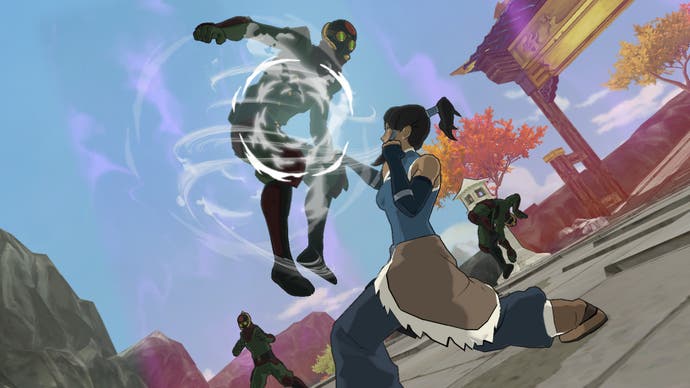
You play as Korra, the protagonist of the eponymous series - Bryan Konietzko and Michael Dante DiMartino's televised sequel to Avatar: The Last Airbender. Korra is an 'avatar', a human who is able to control all the four elements in battle: earth, fire, wind and water. The game's first stage offers you full control of the elements: you switch between each elemental stance with a button press, changing your attack type and move-set in kind. The four fighting styles are pleasingly distinct. Earth is slow and methodical, smashing through enemy blocks and dealing damage in health bar-decimating chunks. Water allows you to hoist Korra into the air on a whirling spout, hurling gobbets of liquid at your enemies. Wind whips and disorientates, twirling foes with nicking attacks that spiral up into high combos.
Platinum is an unrivalled designer of outlandish third-person combat (while From Software dominates the realistic end of the scale) and the studio's talent stands out here, even against the thinness of everything else. Enemies flash red just before they attack, as in Bayonetta, and if you're quick enough you can counter the attack. The timing is unusually stringent. Successfully counter an attack (which you are sometimes forced to do to make progress) and the screen will shift to a paled-out slow-motion effect, during which you have to enter directions on the analogue sticks in order to parry and, finally, hurl your enemy away.
The right trigger sends Korra into an evasive cartwheel, while offensive combinations can be built with different strings of the light and heavy attack. Each of your elemental proficiencies can be levelled up through use, and new attack strings unlocked by purchasing scrolls. The camera struggles to follow the action (even though there is far less going on than in Bayonetta's writhing scenes) and, in the latter stages, when you battle more than one giant enemy in an enclosed space, you sometimes lose sight of Korra for many seconds at a time.
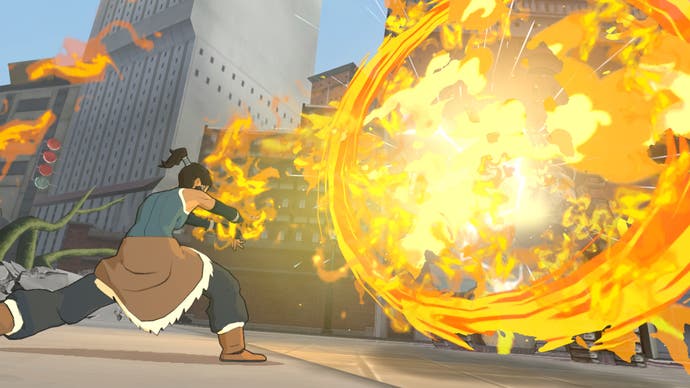
Nevertheless, this is a tightly wound and precise battle system for those with the eye to see, and there are few concessions to younger players on anything but the lowest setting. One stage mid-game demands that you reach 40 combo hits without taking damage before you can progress, the designers forcing players who resort to button-hammering to slow down and take a more considered approach. Combat is undeniably the game's core strength, and yet it's not until late in the game that you're able to fully enjoy its intricacies; after the initial stage, Korra loses all of her elemental powers and spends the rest of the game restoring them, one by one.
Enemies and treasure chests yield a currency, which can be spent on restorative items, and, more interestingly, scrolls that rebalance her strength, defence and hit points. You must retreat to Korra's room in order to check your combo strings and equip items that you've purchased in the shop. You can only equip four types of item at a time (although you can have, for example, up to three health potions equipped in a single slot). This includes talismans, which affect your ambient abilities (by, for example, increasing your speed or attack power), yet must still be equipped. When struggling with a boss on one of the higher difficulty levels it's frustrating to have to travel to the shop to replenish your potion supplies, then to Korra's room to equip them, then finally back into the battle. It's time-wasting design.
As interludes (perhaps even comic relief) to the button-pelting gymnastics of the main game, during some stages Korra climbs on the back of Naga, a large dog-meets-polar bear and streaks through the city's spartan streets in a game of rhythmic timing. Here you slide under barriers, leap over black tooth gaps in the pavement and snap left and right when the narrow streets turn at unforgiving (and architecturally implausible) 90-degree angles. These sections are unusually punitive, and while there's some sport in learning each one's layout in order to perfect a run (and you can practice without penalty), it's a simplistic addition that adds little.
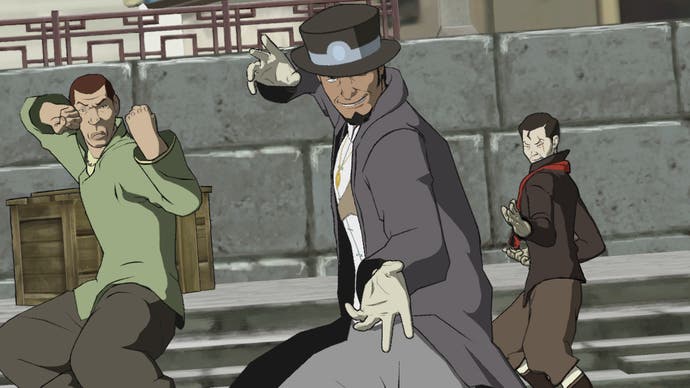
More effective are the occasional 'pro-bending' matches, a professional sport played in the Avatar universe that combines dodgeball and sumo wrestling. Two teams of three members face off on a raised platform, pelting one another with ranged attacks in order to move their opponents to the rear of the platform, zone by zone, till they are knocked off. It's a simple game and simply rendered here, but is an enjoyable interlude nonetheless.
There is some value in The Legend of Korra, both as a game and as a tribute to the cartoon on which it's based, but it falls far short of its potential on both counts. Perhaps the third-person combat theatrics for which the studio is known are not replicable on a small budget. You can't blame the IP, which offers a rich vein of material. Regardless, this is the first major blemish on the studio's reputation; a misfire that means Platinum's name no longer guarantees quality.
